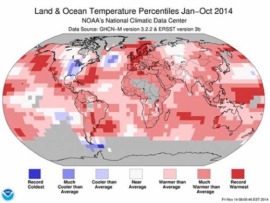January-October 2014 is the hottest such period (January through October) on record, according to the US National Oceanic and Atmospheric Administration (NOAA). When talking about “hottest” what were referring to is the global average temperature over land and ocean surfaces.
 NOAA also noted that October 2014 was the hottest October since records began back in 1880.
NOAA also noted that October 2014 was the hottest October since records began back in 1880.
The combined global land and ocean average surface temperature for the January-October period (according to NOAA) was 0.68°C (1.22°F) over the 20th century average of 14.1°C (57.4°F). That number was even higher in the month of October itself — when it was 0.74°C (1.33°F) over the 20th century average of 14.0°C (57.1°F).
NOAA provides more:
The high October temperature was driven by warmth across the globe over both the land and ocean surfaces and was fairly evenly distributed between the Northern and Southern Hemispheres. The Southern Hemisphere had its hottest October on record and the Northern Hemisphere its third warmest.
October marked the third consecutive month and fifth of the past six with a record high global temperature for its respective month (July was fourth highest).
The Tokyo Climate Center, which is a WMO Regional Climate Centre, also reported that October was the hottest on record. The record was also confirmed by data from NASA’s Goddard Institute for Space Studies.
WMO uses a combination of datasets to compile its annual Statement on the Status of the Global Climate. Additional information is drawn from the ERA-Interim reanalysis-based data set maintained by the European Centre for Medium-Range Weather Forecasts.
Those interested can find more details here.
While short-term predictions are quite hard to accurately make (in most fields anyways), longer terms trends are a good deal easier to spot and base accurate predictions off of. While there is still something of a public debate on the merits of climate change related predictions, the slowly rising temperatures of the past few decades do seem to be showing the predictions as relatively accurate.
There are probably some interesting years ahead.
Image Credit: NOAA